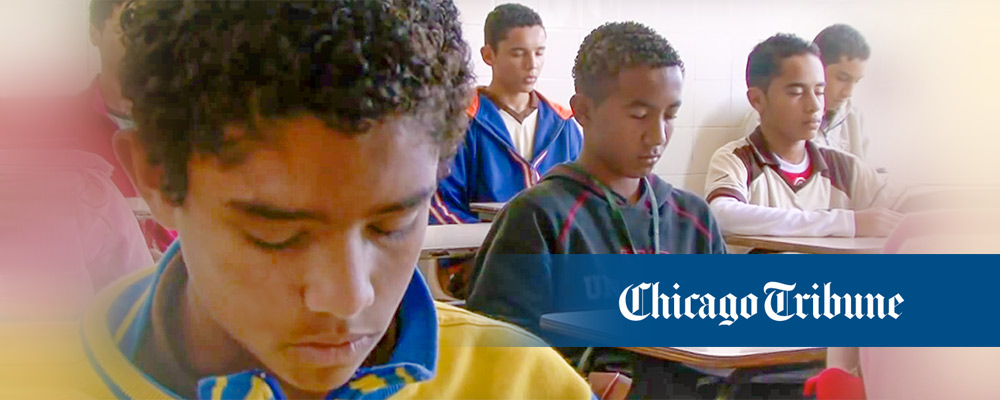“The first time I did it, I felt so relaxed. I felt ready to work more than I ever had. I feel like I can handle any obstacle. I don’t have to feel the weight or stressfulness. I can feel OK, and I can approach situations and deal with them… It was like a vortex in my brain opened up and allowed positive energy in,” says Shameka Jones, a biology teacher at Gage Park High School in southwest Chicago where the (Transcendental Meditation®) TM-based “Quiet Time” program has been introduced to students and faculty.
The program, funded by two anonymous donors, the Pritzker Pucker Family Foundation, the MacArthur Foundation, and the David Lynch FoundationSM, is being studied by the University of Chicago Crime Lab. But is it helping this low-income school?
“As a teacher, I’ve seen a transformation of how we, how I, handle conflict in the classroom.” —Jose Morales, high school teacher
Administrators, Faculty, and Students Already Report Benefits
Gage Park Principal Brian Metcalf already sees benefits: lower suspensions, improved SAT scores, better behavior, greater in-class concentration.
“As a teacher, I’ve seen a transformation of how we, how I, handle conflict in the classroom,” says Jose Morales who was at first skeptical. He also recognizes the improvements among the students.
“I was a real belligerent person and a hothead before, and it’s really calming and releases stress,” says Rakiha, a Gage Park sophomore. “It relaxes me, and it opens my mind up.” Breana, another student, adds, “When you really get into it, I really got some stress off my mind. I really think before I do certain things.”
“The first time I did it, I felt so relaxed. I felt ready to work more than I ever had… It was like a vortex in my brain opened up and allowed positive energy in.” —Shameka Jones, biology teacher
Data from the Chicago Police Department and the Chicago Public Schools
Daniel Hale Williams Preparatory School and Bowen High School have also introduced the program as researchers study “Quiet Time” ‘s effects using data from the Chicago Police Department and the Chicago Public Schools. They look at grades, test scores, attendance and disciplinary records, including in-school infractions and out-of-school arrests, or whether students were victims of crimes. The Crime Lab has been selecting schools in neighborhoods with high homicide levels and disadvantaged kids, and plans to do future research in New York City as well.
According to the Chicago Tribune, ” ‘Quiet Time’ was one of three programs—out of 200 applications—selected by the Crime Lab when it asked for proposals to help address youth violence in the city. The Crime Lab awarded a $300,000 grant to the foundation to launch the program in Chicago Public Schools because of its goal to address the effects of toxic stress on young people. ‘Quiet Time’ also has been implemented in San Francisco, Los Angeles, and New York City.”
Watch the Chicago Education Forum with speakers from the Crime Lab and DLF ►
Watch a short video on how Quiet Time started in schools ►


Comments
TM in the News
Meditation Curbs Violence at San Francisco Schools | 3:11
What happens when the TM technique is added to the curriculum of a struggling school? NBC Nightly News and Cynthia McFadden wanted to find out.
TM in the News
HuffPost Reports: TM Comes to Brooklyn School
In case you haven't heard, Transcendental Meditation is on the minds of many students, teachers, and administrators. Jaweed Kaleem took an in-depth look.
TM in the News
Moms Traumatized by City Violence Join David Lynch TM Program
“For all these years, I’ve been fighting with my brain. I took medication to forget, but you can never forget,” said 49-year-old Beti Guevara, who was just a girl when her brother was slain.